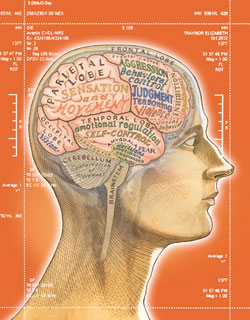Brain Trials: Neuroscience Is Taking a Stand in the Courtroom

Illustration by Elizabeth Traynor
Six weeks after getting his driver’s license, Christopher Tiegreen—a friendly, outgoing 16-year-old who played soccer and sang in his high school chorus—was in a car collision near his home in Gainesville, Ga. Tiegreen’s Isuzu Trooper flipped several times, causing severe head injuries. He was taken by helicopter 50 miles to a hospital in Atlanta, where doctors told his mother he might not make it.
A month later, Tiegreen emerged from a coma a different person. The impact of the crash caused damage to the frontal lobe of his brain and sheared his brain stem. During his recovery and rehabilitation, the usually gentle Tiegreen became violent toward his mother, as well as with other family members and rehab staff. His family sent him to live in various residential facilities, but he frequently was expelled for inappropriate behavior.
On Sept. 11, 2009, Tiegreen, then 23, walked out of a duplex apartment where he was supposed to be under 24-hour supervision. In a yard nearby he attacked a young woman holding her 20-month-old son. He was charged with aggravated assault, criminal attempt to commit a felony, false imprisonment, battery, sexual battery and cruelty to a child in the third degree.
Click here to read the rest of “Brain Trials” from the November issue of the ABA Journal.



